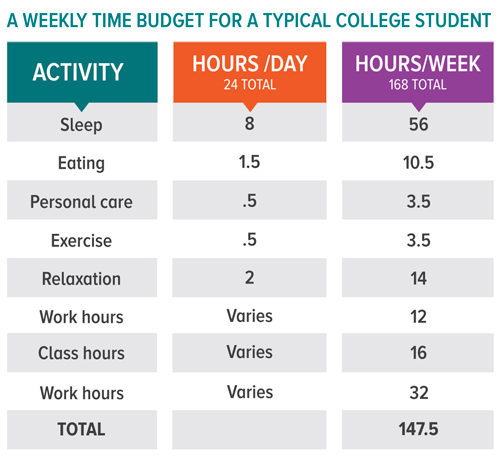 |
If you’re expecting a column on the importance of teaching kids key life skills like how to do laundry and balance a checkbook, I’m going to save you time and let you know up front—this is not that. It’s better. Karen Fischer, a Christian counselor, instead gives us ways that we can all support our own mental health and take control of the hours in our day. Although her perspective is great for young adults, it’s equally important for adults of any age. Plus, Fischer not only tells us how to be mentally strong but also gives us practical ways to practice these skills.
— Nicole Balza

It’s August, and many young people are transitioning to new lives as college students, apprentices in a trade, or full-time workers. Whether it’s back to school or into the work world, being an adult is hard! Feeling overwhelmed is very common. Remember, feelings are not facts! Reminding ourselves of this truth promotes good mental and spiritual health.
A weekly time budget can also be helpful. (Note that a weekly time budget and the ideas that follow are wise for anyone, not just young people.)

Some important items:
- Sleep: It’s the starting point for all the mental strength your brain needs.
- Eating: Your life depends on it, so steward your body with healthy choices.
- Exercise: The mind-body connection is very important to your mental health, so get moving.
- Relaxation and hobbies: God created a beautiful world with many beneficial activities to enjoy.
Note that social media is not included as it can contribute to less-than-helpful thought patterns. Be sure to manage those outlets before they manage you. Spiritual growth is also not part of the schedule, but God’s Word provides the solid foundation for living each day as a redeemed child of God. Make sure to schedule time to worship with other believers.
After all this budgeted time, the average young adult still has 20.5 hours (1,230 minutes) left over in a week. How do we make those minutes matter?
The following ideas support your mental health as a Christian who seeks a relationship with your Savior and wants to steward your thoughts, actions, gifts, talents, and time to the best of your ability.
Combat perfectionism with realism. Pursuit of excellence is a healthy habit. The need to be perfect actually undermines excellence. The culprits are setting unreasonable standards, preoccupation with mistakes, and perceiving disapproval. All these things cloud the truth that God gifted you as you are, at this very moment, for a distinct reason. Pushing past God’s intentions hinders your effectiveness.
HOW: Pause, reflect, and ask yourself, “Is this standard realistic? Have I done the best with what I have right now?” Strive for excellence over perfection. You can’t attain perfection, so avoid it as a goal.
Learn the difference between guilt and shame. Guilt is an emotion that tells us we have broken a moral code. God gave it to us as an indicator of wrongdoing. It is supposed to be there. Because God is merciful, he forgives those wrongdoings and declares that through Jesus’ sacrifice they are paid in full. That forgiveness helps us move forward free of guilt. Shame is what the devil does to make us question whether God really forgives us. Shame gives us thoughts, feelings, and actions that we perpetuate in order to punish ourselves. We can develop habits of self-blame, magnify problems, and perceive ourselves unredeemable. This is a distortion of God’s forgiveness and leaves us feeling defeated and worthless.
Remember, feelings are not facts!
HOW: Know that both guilt and shame are gone in Christ. Hear his words of forgiveness often and practice the mindset that you are free from guilt and shame.
Adopt a growth mindset. Everyone has occasional negative thoughts and feelings of failure. Fostering these negative thoughts creates a failure mindset, which interferes with the ability to succeed. Left unchecked, continual thoughts of failure become habit and inflict terrible damage. The habits of a failure mindset include listening to that inner voice that says you can’t succeed, that you have no choice, or that you are a fraud.
People with a growth mindset believe that their abilities can be developed through dedication and hard work. Brains and talent are just the starting point. This view creates a love of learning and the resilience that is essential for accomplishment.
HOW: When tempted with a failure mindset, ask yourself, “How would God have me grow from this? What actions will stretch the gifts and abilities he has given me?” View difficulty as a challenge or an opportunity to improve. You will be more committed, and you will develop competence over time.
Build meaning in relationships. God acted on day six of creation to connect people. Isolation is not good, and the pandemic showed us just how wise God’s intention is. All of us need authentic and vulnerable connection, the kind God affords to us.
God sees us fully and loves us anyway. This spiritual awareness is the most powerful mental wellness tool there is, and we get to live it out in our lives with others.
HOW: Be sure some of the minutes in your week include intentional, meaningful interactions with God and others. God’s Word is readily available in various forms so you can read or hear his promises and you can pray to him anywhere, anytime. Also find ways to connect with others: A phone call, a cup of coffee, volunteerism, or group activities help build and strengthen relationships. Push to be authentic and vulnerable.
Replace regret with motivation. Regret is an emotional state that is healthy only in small doses and only when let go of in favor of a new path. Regret can turn into lifelong rumination over what could have been, which dulls our ability to appreciate what is. Habitual regret can lead to depression, anxiety, sleep problems, and more. Looking at regret, or decisions that did not go the way we envisioned, is normal, but living in that mindset is futile.
HOW: Replace regrets with reliance, which will propel motivation. Even if we feel unsure in the moment that we can trust God’s words to work all things for our good, we can practice relying on him and his unfailing promises to do so. This then walks us past regret and toward a path motivated to see what he has ahead for us.
Author: Karen Fischer
Volume 109, Number 08
Issue: August 2022
- Parent conversations: How can parents and kids manage stress?
- Parent conversations: What do your prayers for your children include?
- Parent conversations: How do we resist making our parenting law-based?
- Parent conversations: What Bible passages do you turn to most as a parent?
- Parent conversations: How can we help kids develop positive, healthy habits?
- Parent conversations: What tactics do you use to encourage children to tackle difficult tasks?
- Parent conversations: How can we model good listening skills for our kids?
- Parent conversations: How do we help our kids move on from mistakes?
- Parent conversations: How can we instill gratitude in our children?
- Parent conversations: How can parents find the balance between being too restrictive and too permissive?
- Parent conversations: How can we teach kids to be good friends?
- Parent conversations: What life skills will help young people as they transition to adulthood?
- Parent conversations: How do we discuss death with our children?
- Parent conversations: What does it look like for a father to be a strong Christian leader?
- Parent conversations: How can we help young adults stay engaged in the church?
- Parent conversations: What do parents need to know about video games?
- Parent conversations: How do parents not let worry get the best of them?
- Parent conversations: How do we teach our kids to value all people?
- Parent conversations: When parenting philosophies differ
- Parent conversations: How can we help today’s overwhelmed teens?
- Parent conversations: How can parents maintain a healthy marriage?
- Parent conversations: You might be a Lutheran parent if . . .
- Parent conversations: Parenting post–high school: What is a parent’s role?
- Parent conversations: How can families use the hymnal in their worship life at home?
- Parent conversations: What should Christian parents teach their children about gender?
- Parent conversations: What is vocation? How does it apply to parenting?
- Parent conversations: Why do siblings fight? How should I react when they are fighting?
- Parent conversations: How do we teach children resilience?
- Parent conversations: How do I approach vaccines as a Christian parent?
- Parent conversations: How can I explain the Sixth Commandment to a young child?
- Parent conversations: How can I help my child have an optimistic outlook?
- Parent conversations: What if we can’t follow our Christmas traditions this year?
- Parent conversations: What are ways to foster a rich prayer life in children?
- Parent conversations: How can I let the gospel shine as I parent?
- Parent conversations: How should I handle a child’s separation anxiety?
- Parent conversations: How should families prepare to go back to school?
- Parent conversations: How does a teen’s brain work?
- Parent conversations: How much should I monitor my child online?
- Parent conversations: How can parents reassure children during an uncertain time?
- Parent conversations: How can I stay calm when my child is out of control?
- Parent conversations: Should I give something up for Lent?
- Parent conversations: How can I keep my child engaged in attending church?
- Parent conversations: How can we help a stressed-out kid?
- Parent conversations: How can we nurture a proper view of “stuff”?
- Parent conversations: How involved should parents be in a child’s homework?
- Heart to heart: Parent conversations: Are we modeling kindness for our children?
- Heart to heart: Parent conversations: What’s the best parenting advice you’ve received or given?
- Heart to heart: Parent conversations: How should we handle it when people undermine our parenting decisions?
- Parent conversations: How can we prepare children for summer camp?
- Heart to heart: Parent conversations: What’s a parent’s role as a child dates?
- Heart to heart: Parent conversations: How do parents find contentment?
- Heart to heart: Parent conversations: How can we help a family with a sick parent?
- Heart to heart: Parent conversations: How can parents model healthy cell phone use?
- Parent conversations: How can we protect kids without scaring them?
- Parent conversations: What does your family’s bedtime routine look like?
- Parent conversations: What do I need to consider before I give my child a cell phone?
- Parent conversations: How can we teach gentleness and strength at the same time?
- Parent conversations: What should we do when our children grow silent?
- Parent conversations: What should we teach our children about the Reformation?
- Parent conversations: Do we want our children to be leaders or followers?
- Parent conversations: How does a parent’s role change over time?
- Parent conversations: How should I handle a disagreement with my child’s teacher?
- Parent conversations: What are the building blocks of a strong parent/child relationship?
- Parent conversations: What is our goal as parents?
- Parent conversations: What Christmas traditions do you cherish in your family?
- Parent conversations: How can we raise a generation that cherishes life?
- Parent conversations: What are the best Bible story books for family devotions?
- Parent conversations: Why should children obey their parents?







